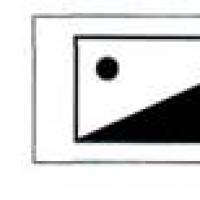The test will show “Are you a conflict-ridden person? Test “Are you a conflict-ridden person?”
For each question, choose one answer.
1. A dispute broke out on public transport. What are you doing?
a - don’t interfere;
b - you can intervene by taking the side of the victim;
V- I always interfere.
2. At meetings and conferences, do you criticize management for mistakes?
a - no;
b - depending on personal attitude towards him;
in - always.
3. Your manager outlines his work plan, which seems to you to be unsuccessful. Will you offer your plan?
a - if others support you, then yes;
b - of course;
V- No.
4. Do you like to argue with your colleagues and friends?
A- only with those who are not offended;
b- yes, but only on fundamental issues;
V- yes, with everyone and for any reason.
5. Someone is trying to get ahead of you in line for a scholarship or salary.
A- Believing that you are worse than him, you try to bypass the queue;
b- you are indignant, but to yourself;
V-- openly express your indignation.
6. Imagine that you are considering an innovation proposal from your colleague, in which there is a bold idea, but there are also mistakes. You know that your opinion will be decisive. What will you do?
a - speak out about the pros and cons of this proposal;b - talk about the advantages of the offer and advise givingthe opportunity to try out an idea;V- you will only criticize.
7. Imagine: your mother-in-law (or mother-in-law) constantly tells you about the need to save money, about your extravagance, and every now and then she buys expensive things. She wants to know your opinion about your latest purchase. What will you tell her?
a - that you approve the purchase;
b- that this thing is tasteless;
c - quarrel with her over the purchase.
8. You have met teenagers who curse and smoke. How will you react?
A- you will not interfere;
b- reprimand them;
V- if this happens in a public place, you will reprimand their.
9. In a restaurant or store you notice that you are being shortchanged. What will you do?
A- don’t tip the waiter, but ask the seller for changewow, even little things;
b - ask him to count again; V- cause a scandal.
10.You are in a holiday home. The administration is engaged in extraneous matters without fulfilling its functional duties. Does this outrage you?
A- yes, but you don't speak out;
b- complain about her;
c - take out your dissatisfaction on junior staff.
11. You argue with your younger teenage brother or sister and find out they are right. Do you admit your mistake?
a - yes;
b- No;
Decoder:
Answer price: “a” - 4 points, “b” - 2 points, “c” - 0 points.
Key:
Up to 14 points.
You are looking for reasons to argue, most of which are simply petty. Love to criticize only when it benefits you. Think about whether there is an inferiority complex hidden behind your behavior?
15-29 points.
They say about you that you are a conflicted person. You persistently defend your opinion, regardless of how it will affect your personal and work relationships.
30-44 points.
You are tactful, easily avoid conflict situations, strive to be pleasant to others, but when they need help, you do not always dare to provide it. Maybe you only demand everything from others.
Application15
Test “Are you a conflict-ridden person?”
If you often behave exactly as stated in the sentence in a conflict situation, then give 3 points; from time to time – 2 points; rarely – 1 point.
I threaten or fight.
I try to understand the enemy’s point of view and take it into account.
I'm looking for compromises.
I admit that I am wrong, even if I cannot completely believe it.
I avoid the enemy.
I wish you to achieve your goals no matter what.
I'm trying to figure out what I agree with and what I absolutely don't agree with.
I'm making a compromise.
I give up.
Changing the subject.
I persistently repeat one phrase until I achieve my goal.
I’m trying to find the source of the conflict, to understand where it all started.
I will give in a little and thereby push the other side to make concessions.
I offer peace.
I'm trying to make a joke out of it.
Processing test results:
Type “A”: sum of points numbered 1, 6, 11.
Type “B”: sum of points numbered 2, 7, 12.
Type “B”: sum of points numbered 3, 8, 13.
Type “G”: sum of points numbered 4, 9, 14.
Type “D”: sum of points numbered 5, 10, 15.
Interpretation:
“A” is a tough style of resolving conflicts and disputes. These people stand their ground to the last, defending their position. This is the type of person who considers himself always right.
"B" is a democratic style. These people believe that it is always possible to reach an agreement; during a dispute, they offer an alternative and look for a solution that satisfies both sides.
"B" is a compromise style. From the very beginning, a person is ready to compromise.
"G" is a soft style. A person destroys his opponent with kindness, readily takes the enemy’s point of view, abandoning his own.
“D” is a fading style. A person’s credo is to leave in a timely manner, before a decision is made. Strives not to lead to conflict and open confrontation.
REMINDER
Friends! A conflict situation can radically change your life! Try to make these changes for the better!
1. Before entering into a conflict situation, think about what result you want to get.
2. Make sure that this result is really important to you.
3. In a conflict, recognize not only your interests, but also the interests of the other person.
4. Observe ethical behavior in a conflict situation, solve the problem, and do not settle scores.
5. Be firm and open if you are convinced that you are right.
6. Force yourself to hear your opponent's arguments.
7. Do not humiliate or insult another person so as not to be burned with shame when meeting him and not to be tormented by remorse.
8. Be fair and honest in conflict, do not feel sorry for yourself.
9. Know how to stop in time so as not to be left without an opponent.
10. Value your own self-respect when deciding to enter into conflict with someone who is weaker than you.
The test allows you to assess the degree of your conflict or tactfulness. Choose one of the three proposed answer options - “a”, “b” or “c”.
Questionnaire
1. Imagine that it starts on public transport
dispute. What are you doing?
a) avoid interfering in a quarrel;
b) you can intervene, take the side of the victim, the one who is right;
c) always intervene and defend your point of view to the end.
2. Do you criticize management at a meeting for mistakes made:
b) yes, but depending on your personal attitude towards him;
c) always criticize for mistakes.
3. Your immediate superior sets out a work plan that seems irrational to you. Would you suggest your plan, which seems better to you:
a) if others support you, then yes;
b) of course, you will support your plan;
c) you are afraid that you may be deprived of your bonus for criticism.
4. Do you like to argue with your colleagues and friends:
a) only with those who are not offended, and when disputes do not spoil your relationship;
b) yes, but only on fundamental, important issues;
c) you argue with everyone and on any occasion.
5. Someone is trying to jump ahead of you in line:
a) considering that you are no worse than him, you will try to bypass the queue;
b) you are indignant, but to yourself;
c) openly express your indignation.
6. Imagine that you are considering an innovation proposal, an experimental work of your colleague, in which there are bold ideas, but there are also mistakes. You know that your opinion will be decisive. What you will do:
a) speak out about both the positive and negative aspects of this project;
b) highlight the positive aspects of his work and offer to provide the opportunity to continue it;
c) you will criticize her: to be an innovator, you cannot make mistakes.
7. Imagine: your mother-in-law (mother-in-law) constantly tells you about the need for savings and frugality, about your wastefulness, and every now and then she buys expensive things. She wants to know your opinion about her latest purchase. What will you tell her:
a) approve the purchase if she enjoyed it;
b) note that this thing is tasteless;
c) quarrel with her again because of this.
8. You met children who smoke. How do you react:
a) you think: “Why should I ruin my mood because of strangers, poorly behaved mischievous people?”;
b) reprimand them;
c) if it was in a public place, you would reprimand them.
9. In a restaurant you notice that the waiter has shortchanged you:
a) in this case, you do not give him the tip that you would have prepared in advance if he had acted honestly;
b) ask him to count the amount again in front of you;
c) this will be a reason for a scandal.
10. You are in a holiday home. The administrator is engaged in extraneous matters, having fun himself, instead of fulfilling his duties: he does not monitor the cleaning of the room and the variety of the menu. Does this bother you:
a) yes, but even if you express some complaints to him, it is unlikely to change anything;
b) you find a way to complain about him, let him be punished or even fired from his job;
c) you take your dissatisfaction out on junior staff (cleaners, waitresses).
11. You argue with your teenage son and find out he's right. Do you admit your mistake:
b) of course, you admit it;
Summarize
Using the key, calculate the number of points.
Each answer option has its own score.
answer “a” - 4 points;
answer “b” - 2 points;
answer “c” - 0 points.
30 - 44 points. You are tactful. You don’t like conflicts, even if you can smooth them out, you easily avoid critical situations. When you have to get into an argument, you take into account how this will affect your official position or friendships. You strive to be pleasant to others, but when they need help, you do not always dare to provide it. Don't you think that by doing so you are losing self-respect in the eyes of others?
15 - 29 points. They say about you that you are too principled or even a conflicted person. You persistently stand up for your opinions, regardless of how it affects your work or personal relationships, and you are respected for this.
10 - 14 points. You are looking for reasons for disputes, most of which are unnecessary and petty. Love to criticize, but only when it benefits you. You impose your opinion, even if you are wrong. Will you be offended if you are considered a scandal-monger? Think about whether there is an inferiority complex hidden behind your behavior?
Note. If necessary, the test must be “adapted” to the classroom.
Appendix 2.
Assertiveness test
Typically, assertiveness is understood as naturalness and independence from external influences and assessments, the ability to independently regulate one’s own behavior and be responsible for it. An assertive person is one who is responsible for his own behavior, demonstrates self-respect and respect for others, is positive, listens, understands, and tries to reach a working compromise. This test will help you find out your level of assertiveness.
Instructions: Select “yes” or “no” from the following options.
1. I am annoyed by other people’s mistakes: no;
2. I can remind a friend of my debt: yes, no;
3. From time to time I tell lies: no;
4. I am able to take care of myself: yes no;
5. I happened to ride as a “hare”: no;
6. Competition is better than cooperation: yes no;
7. I often torment myself over trifles: no;
8. I am an independent person and quite decisive: no;
9. I love everyone I know: yes no;
10. I believe in myself, I have enough strength to cope with current problems:
11. Nothing can be done, a person must always be on guard in order to be able to protect his interests: no;
12. I never laugh at indecent jokes: no;
14. I don’t allow anyone to twist me into ropes. I will protest: no;
15. I support every good undertaking: no;
16. I never lie: yes, no;
17. I am a practical person: yes no;
18. The only thing that depresses me is the fact that I might fail: no;
19. I agree with the saying: “Look for a helping hand first of all at your own shoulder”: no;
20. Friends have a great influence on me: yes no
21. I am always right, even if others think otherwise: yes no
22. I agree that it is not victory that is important, but participation: yes no
23. Before I do anything, I’ll think carefully about how others will perceive it: yes, no
24. I never envy anyone: no
Now count the number of positive answers in the following positions:
1, 6, 7, 11, 13, 18, 20, 23 Count A =
2, 4, 8, 10, 14, 17, 19, 22 Count B =
3, 5, 9, 12, 15, 16, 21, 24 Count B =
THE HIGHEST INDICATOR WAS ACHIEVED IN SCORE A: You have an idea of assertiveness, but you don’t use it much in life. You often feel dissatisfied with yourself and others.
HIGHEST SCORE ACHIEVED IN SCORE B: You are on the right track and can master assertiveness very well. In principle, you are already able to act in the right direction. At times, your attempts to act assertively result in aggressiveness. But it is not important. What student hasn't gotten himself into trouble?
HIGHEST SCORE ACHIEVED IN COUNT B: Despite the results of the previous two calculations, you have a good chance of mastering assertiveness. In short, you have formed an opinion about yourself and your behavior, you evaluate yourself realistically, and this is a good basis for acquiring any skill necessary when contacting others.
LEAST SCORE ACHIEVED IN SCORE A: It is not a tragedy that you fail to take advantage of many of the chances that life gives you. It is important to learn to live in harmony with yourself and know what needs to be done.
LOWEST Score ACHIEVED IN ACCOUNT B: Assertiveness can be learned. As S. Lek said: “Training is everything, even cauliflower is just a well-trained white cabbage.”
LEAST INDICATOR ACHIEVED IN SCORE B: Now this is a problem. You overestimate yourself and are not entirely sincere. It's not so much about self-deception, but about seeing yourself in a better light. It would be a good idea to reflect on yourself.
Appendix 3.
Today I prepared another test for you.
If you are an entrepreneur or are somehow involved in the trading process and you need to build your team, then to achieve maximum results you need to select people who will work harmoniously with each other.
Therefore, today is a conflict test. There is also one that will also come in handy.
But first, let's figure out what conflict is? And who is a conflicted person?
What is conflict?
Here is the definition of conflict from Wikipedia:

Conflict- a situation or dispute in which each of two parties with opposing views seeks to take a position that is incompatible and opposite to the interests of the other party.
Conflict is a special interaction between individuals, groups, and associations that arises when they have opposing views, positions, and interests.
It is worth noting that conflict can not only be destructive in nature, but also have constructive functions.
The conflicting parties can be social groups of people or individual individuals.
Who is a conflicted person?
A conflict person is a person who manages to develop an increased number of conflicts out of the blue.
Personality conflict is a trait of a person’s character and habits that leads to the maximum frequency of conflicts and a person’s entry into them.
Personal conflict can be determined by a combination of a number of psychological factors, characteristics of temperament, level of aggressiveness, communication skills and the emotional state of a person.
Therefore, conflict is a cumulative indicator that is associated with a person’s personal prerequisites.
Conflict test
Now determine your conflict level.
Take a piece of paper, pen or pencil and try to answer the questions as honestly as possible by choosing one of the answer options A), b) or V). Then use the key to determine the test score. Then open the test result opposite the result obtained.
Conflict Test Questions
1. Imagine that on public transport a quarrel begins. What will you do?
a) I will not interfere in the quarrel
b) I can intervene, take the side of the victim, the one who is right
c) I always intervene and defend my point of view to the end
2. Do you criticize management for mistakes made at meetings?
a) I always criticize for mistakes
b) yes, but depending on my personal attitude towards him
3. Your immediate boss sets out his work plan, which seems irrational to you. Will you suggest your plan, which seems better to you?
a) if others support me, then yes
b) of course, I will offer my plan
c) I’m afraid that I may be deprived of my bonus for this
4. Do you like to argue with your colleagues and friends?
a) only with those who are not offended, and when disputes do not spoil our relationship
b) yes, but only on fundamental, important issues
c) I argue with everyone and on any occasion
5. Someone is trying to get ahead of you without waiting in line. Your actions?
a) I think that I’m no worse than him, and I’m also trying to get around the queue
b) I’m indignant, but to myself
c) I openly express my indignation
6. Imagine that you are considering a project in which there are bold ideas, but there are also mistakes. You know that the fate of this work will depend on your opinion. What will you do?
a) I will speak about both the positive and negative aspects of the project
b) I will highlight the positive aspects of the project and provide the author with the opportunity to continue its development
c) I will criticize: to be an innovator, you cannot make mistakes
7. Imagine that your mother-in-law (mother-in-law) tells you about the need for savings and frugality, about your extravagance, and every now and then she buys expensive antiques. She wants to know your opinion about her latest purchase. What will you tell her?
a) I will say that I approve of the purchase if it gave her pleasure
b) I will say that this thing has no artistic value
c) I will swear, I will quarrel with her because of this
8. In the park you met teenagers who smoke. How do you react?
a) I reprimand them
b) I think: why should I spoil my mood because of strangers, poorly behaved youths?
c) if it was not in a public place, then I would reprimand them
9. In a restaurant you notice that the waiter has shortchanged you. Your actions?
a) in this case I will not tip him, although I was going to do so
b) I’ll ask him to draw up the bill again in front of me
c) I’ll tell him everything I think about him
10. You are in a holiday home. The administrator is engaged in extraneous matters, having fun, instead of fulfilling his duties: monitoring the cleaning of the rooms, the variety of the menu... Does this outrage you?
a) yes, and I find a way to complain about him, demanding punishment or even dismissal from work
b) yes, but even if I express some complaints to him, it is unlikely to change anything
c) yes, but as a result I find fault with the service staff - the cook, the cleaning lady, or take my anger out on my wife
11. You argue with your teenage son and find out he's right. Do you admit your mistake?
b) of course, I admit
c) I will try to reconcile our points of view
Answer Key to Conflict Test Questions
| Question number and Question answer ratings | A | b | V |
| 1 | 4 | 2 | 0 |
| 2 | 0 | 2 | 4 |
| 3 | 2 | 0 | 4 |
| 4 | 4 | 2 | 0 |
| 5 | 0 | 4 | 2 |
| 6 | 2 | 4 | 0 |
| 7 | 4 | 2 | 0 |
| 8 | 0 | 4 | 2 |
| 9 | 4 | 2 | 0 |
| 10 | 0 | 4 | 2 |
| 11 | 0 | 4 | 2 |
After you have calculated your score, look at the test results. Click on “+” and you will see your result.
Evaluation of conflict test results
From 30 to 44 points
You are tactful. Don't like conflicts. You know how to smooth them out and easily avoid critical situations. When you have to get into an argument, you take into account how this may affect your job position or friendships. You strive to be pleasant to others, but when they need help, you do not always dare to provide it. Do you think that by doing so you are losing respect for yourself in the eyes of others?
From 15 to 29 points
They say about you that you are a conflict person. You persistently defend your opinion, regardless of how it will affect your work or personal relationships. And for this you are respected.
Up to 14 points
You are petty, looking for reasons for arguments, most of which are unnecessary. Love to criticize, but only when it benefits you. You impose your opinion, even if you are wrong. You will not be offended if you are considered a scandal-monger. Think about whether there is an inferiority complex hidden behind your behavior?
I hope your results please you. If not, then you know what you need to work on. Share your thoughts on this matter in the comments.
Good luck, success and prosperity to everyone.
Instructions: You are asked to answer 7 questions. Each question has three answer options. Choose the one that suits you best.
1. Imagine an argument breaks out on public transport.
in a raised voice. You:
a) avoid interfering;
b) you can take the side of the victim or the one who is right;
c) always intervene and defend your point of view.
2. At a meeting (meeting, etc.) do you criticize management for mistakes made?
b) yes, but depending on your personal attitude towards him;
c) you always criticize not only your superiors for mistakes, but also
those who protect him.
3. Do you like to argue with your colleagues and friends?
a) only if they are not touchy and these disputes do not spoil your
relationships;
b) yes, but only on fundamental, important issues;
c) you argue with everyone and on any occasion.
4. At home, an under-salted dish was served for lunch. Your actions:
a) don’t notice such a trifle;
b) silently take the salt shaker;
c) cannot resist making a comment and, perhaps, demonstratively refuse to eat.
5. Someone stepped on your foot on the street or in public transport. Your reaction:
a) look at the offender with indignation;
b) make a dry remark;
c) speak out without mincing words.
6. Someone close to you bought something you didn’t like. You:
a) remain silent;
b) limit yourself to a brief tactful comment;
c) make a scandal about wasting money.
7. Unlucky in the lottery. How do you perceive this?
a) try to be indifferent, but in your heart promise yourself never to participate in it again;
b) you will not hide your annoyance, but you will treat what happened with humor and promise to take revenge;
c) a ticket without winning will ruin your mood for a long time.
Processing the results
“b” - 2 points;
“c” - 0 points.
Calculate the total points. If you typed:
from 20 to 28 points - You are tactful, do not like conflicts, and avoid critical situations. When you have to get into an argument, you take into account how this will affect your position or friendships. You strive to be pleasant to others;
from 10 to 18 points- they say about you that you are a conflict person, but in fact you conflict only when there is no other way out and all means have been exhausted. You persistently defend your opinion, regardless of how it will affect your position, without going beyond the bounds of correctness. For all this you are respected;
8 or less points - you are looking for a reason to argue, most of which are unnecessary and petty. Love to criticize, but only when it benefits you. You strive to impose your opinion, even if you are not sure that you are right.
Test No. 11 Behavior strategy in conflict
Instructions: You are offered 15 statements. Rate each point of the test method as follows:
“disagree at all” - 1 point;
“disagree” - 2 points;
“rather agree” - 3 points;
“agree” - 4 points;
“completely agree” - 5 points.
1. I am a principled person and never change my position.
2. It is difficult for me to defend my position, even if I know for sure that I am right.
3. I spend a lot of time looking for common ground.
5. I respond to the suggestions of others, but I myself am not inclined to take the initiative.
6. I emerge victorious from any conflict.
7. I avoid tense situations, even though it might cause problems.
get injured.
8. I reconsider my point of view, having felt during the discussion that I was wrong.
9. I spend a lot of time on the problems of others and often forget about myself.
10. I easily agree to give in if someone else does the same.
11. I continue the argument until the interlocutor is forced to accept my point of view.
12. I achieve effective results when working under the guidance of a more experienced partner.
13. I am happy to take the initiative in reconciling the parties.
14. If it makes someone else happy, I give him the opportunity
insist on your own.
15. I often agree to the first condition that leads to the resolution of a problem in a relationship.
Processing the results
Next to the numbers indicating the statement number, put the corresponding score and calculate their sum.
|
Behavior strategy |
No. of statements |
Sum of points |
|
Rivalry | ||
|
Avoidance | ||
|
Cooperation | ||
|
Device | ||
|
Compromise |
The strategy of behavior in a conflict situation is considered expressed if the sum of points exceeds 10.
 Chocolate dipped cakes: recipes with photos and videos
Chocolate dipped cakes: recipes with photos and videos Fortune telling by menstruation - is it true?
Fortune telling by menstruation - is it true? Cake with chocolate drips: a recipe for how to beautifully pour chocolate over the dessert so that it drips, photo
Cake with chocolate drips: a recipe for how to beautifully pour chocolate over the dessert so that it drips, photo Game exercises to overcome phonetic-phonemic underdevelopment in children of primary school age Formation of phonemic hearing in primary schoolchildren
Game exercises to overcome phonetic-phonemic underdevelopment in children of primary school age Formation of phonemic hearing in primary schoolchildren Cards for homework "differentiation of sounds y - l"
Cards for homework "differentiation of sounds y - l" Preparing children with mental retardation for school
Preparing children with mental retardation for school Thesis: Features of phonemic perception in preschool children with phonetic-phonemic speech underdevelopment When examining phonemic speech perception, it is noted
Thesis: Features of phonemic perception in preschool children with phonetic-phonemic speech underdevelopment When examining phonemic speech perception, it is noted